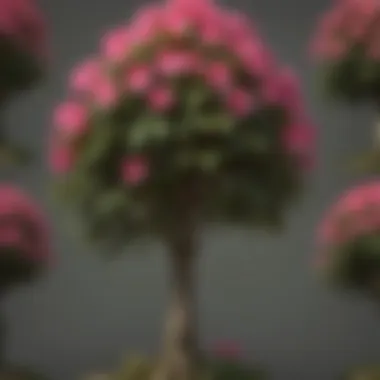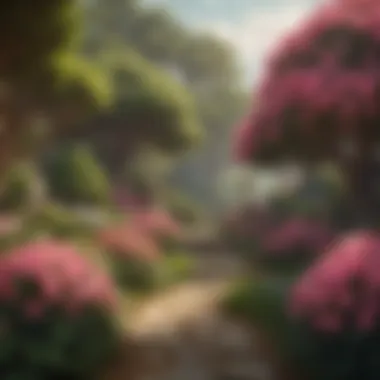Unveiling the Enchanting World of Rhododendrons: Origins, Varieties, and Beauty


Game Reviews
Amidst the vibrant world of gardening enthusiasts, rhododendrons stand out as captivating flora deserving closer inspection. Much like a complex video game, these flowering plants offer a multitude of features akin to gameplay mechanics that dictate their growth and blooming patterns. By delving into the intricate mechanisms behind their cultivation and nourishment, one can unlock the secrets to a thriving rhododendron garden. Each variety is akin to a distinct character in a game, boasting unique attributes that set them apart from one another.
Gameplay Features and Mechanics
Rhododendrons showcase a fascinating array of gameplay features and mechanics in the horticultural realm. From their specific sunlight and soil requirements acting as fundamental gameplay rules to the intricate process of pruning and fertilizing serving as advanced mechanics, cultivating these plants is akin to mastering a sophisticated game. Understanding how to navigate these features is key to witnessing the vibrant blooms and lush foliage that make rhododendrons a standout in any garden.
Storyline and Quests
Exploring the storyline and quests of rhododendrons unveils a tale of resilience and beauty. Each plant's journey from seed to flourishing bloom presents a narrative of growth and adaptation, reminiscent of embarking on a quest in a fantastical realm. Unraveling the challenges they face, such as pests and diseases, mirrors overcoming obstacles in a game, with successful cultivation marking the completion of a rewarding quest.
Visuals and Sound Design
The visuals and sound design of rhododendrons contribute significantly to their enchanting allure. Their vibrant blooms paint a visual masterpiece in gardens, akin to stunning graphics in a well-designed game. The delicate rustle of their foliage in the wind provides a serene soundtrack, completing the immersive experience of being in the presence of these botanical wonders.
Comparison with Previous Titles
Comparing the characteristics of different rhododendron varieties is akin to evaluating sequels in a beloved game series. Just as each new installment introduces fresh gameplay elements and storylines, distinct rhododendron types bring unique colors, shapes, and sizes to the forefront. Examining their traits side by side allows for a comprehensive understanding of their evolution and impact within the realm of horticulture.
Introduction to Rhododendrons
Rhododendrons are a fascinating subject to explore within the realm of horticulture and botany. These beautiful flowering plants have captured the interest of enthusiasts, researchers, and gardeners alike due to their diverse characteristics and aesthetic appeal. Understanding the fundamentals of Rhododendrons is crucial in appreciating their significance in the natural world and human cultivation practices. By delving into their origins, evolutionary history, and cultural importance, we can unravel the mysteries behind these alluring plants.
Exploring the Origins of Rhododendrons


The roots of Rhododendrons trace back to ancient times, with their presence found in various regions across the globe. Exploring their origins sheds light on how these plants have adapted and diversified over centuries, showcasing their resilience and ability to thrive in different environments. Understanding where Rhododendrons come from provides valuable insights into their genetic makeup and survival strategies, offering a glimpse into the evolutionary journey of these botanical wonders.
Evolutionary Insights into Rhododendron Species
The evolutionary trajectory of Rhododendron species is a compelling narrative of adaptation and speciation. By studying the genetic markers and distinct traits of different Rhododendron varieties, researchers can uncover evolutionary patterns and relationships within this plant genus. Insights into Rhododendron evolution not only expand our knowledge of plant biodiversity but also contribute to conservation efforts and breeding programs aimed at preserving unique genetic characteristics.
Historical Significance of Rhododendrons
Throughout history, Rhododendrons have held symbolic meanings and practical uses in various cultures. Their presence in folklore, art, and literature reflects their enduring appeal and cultural value. Examining the historical significance of Rhododendrons provides a deeper appreciation of how these plants have been intertwined with human societies, traditions, and beliefs. By exploring their past roles and associations, we can better understand the enduring allure of Rhododendrons in the modern world.
Diverse Varieties of Rhododendrons
The section titled 'Diverse Varieties of Rhododendrons' in this article plays a crucial role in expanding our understanding of the vast array of rhododendron species available. By delving into the intricate details of different varieties, enthusiasts can better appreciate the diverse beauty and characteristics each type brings to the table. Understanding these variations not only enhances our horticultural knowledge but also allows us to make informed decisions when selecting plants for our gardens or landscapes. This segment will focus on elucidating the significance of exploring diverse rhododendron varieties, shedding light on the specific elements, benefits, and considerations that come with these unique plants.
Understanding Rhododendron Classification
Rhododendron Species
Delving into the realm of Rhododendron species unveils a world of botanical wonders. These species boast a plethora of unique characteristics, ranging from bloom colors and sizes to foliage textures and growth habits. One key feature that sets Rhododendron species apart is their genetic purity, often resulting in distinct traits passed down through generations. By discussing the specific aspects of Rhododendron species, we gain valuable insight into their contribution to the overall biodiversity of these plants. Their resilience, adaptability, and striking visual appeal make them a popular choice for horticulturalists and garden enthusiasts alike. Despite variations in requirements for optimal growth, the diverse nature of Rhododendron species ensures there is a suitable option for every gardening need.
Hybrid Varieties
The realm of hybrid Rhododendron varieties introduces a fascinating blend of traits derived from carefully controlled cross-pollination. Hybridization aims to combine the best features of different species, yielding plants with enhanced vigor, unique colorations, and sometimes even extended bloom seasons. Highlighting the key characteristics of hybrid varieties elucidates their significance in this article by showcasing the innovation and artistry involved in creating these distinct cultivars. Their adaptability to various climates, soil types, and light conditions make hybrid Rhododendrons a sought-after choice for gardeners looking to add a touch of diversity to their green spaces.
Popular Cultivars
Popular Rhododendron cultivars have garnered attention for their exceptional beauty, reliability, and ease of cultivation. These cultivars are often preferred for their tried-and-tested performance, thriving in a range of environments and requiring minimal maintenance. Exploring the unique features of popular cultivars provides valuable insights into their advantages and potential drawbacks within the context of this article. By examining factors such as bloom size, color intensity, and growth habits, readers can make informed decisions when selecting cultivars that align with their aesthetic preferences and gardening goals.


Cultivation and Care of Rhododendrons
Essential Growing Conditions for Rhododendrons
Rhododendrons thrive in acidic soils with good drainage and prefer partial shade to protect their delicate foliage from harsh sunlight. Adequate moisture levels are essential, especially during the plant's growing season. A key consideration is to avoid waterlogged conditions that can lead to root rot. Additionally, mulching around the base of the plants helps retain moisture and insulate the roots during temperature fluctuations.
Pruning Techniques for Healthy Rhododendron Plants
Maintaining healthy rhododendron plants involves regular pruning to promote optimal growth and flowering. The key to successful pruning lies in removing dead or diseased branches, shaping the plant for a balanced appearance, and encouraging new growth. Using clean, sharp tools to make precise cuts minimizes stress on the plant and reduces the risk of damage or disease. Timing is crucial, with early spring after blooming being the ideal period for pruning.
Pest and Disease Management Strategies
Effective pest and disease management is essential for safeguarding rhododendrons against common threats such as lace bugs, weevils, and powdery mildew. Implementing preventive measures like regular inspections, promoting beneficial insects, and maintaining plant hygiene can help deter infestations. In cases of infestation, targeted treatments such as neem oil or insecticidal soap provide eco-friendly solutions to combat pests while minimizing harm to beneficial wildlife and pollinators.
The Splendor of Rhododendron Blooms
The section on 'The Splendor of Rhododendron Blooms' within this comprehensive article on rhododendrons holds paramount importance due to its focus on the mesmerizing beauty and enchanting allure of rhododendron flowers. Throughout the botanical realm, rhododendrons are revered for their vibrant blooms, lush foliage, and diverse array of colors. The discussion in this section delves deep into the visual spectacle offered by rhododendron blooms, encapsulating their essence and significance in the world of horticulture and garden design.
Unveiling the Beauty of Rhododendron Flowers
Within this subsection, we embark on a journey to uncover the sheer beauty and intricacies of rhododendron flowers. These floral wonders exhibit a stunning variety of shapes, sizes, and textures, each contributing to their overall allure and visual impact. From delicate petals to intricate patterns, exploring the beauty of rhododendron flowers offers a profound appreciation for nature's artistry at its finest.
Seasonal Flowering Patterns and Colors
The seasonal flowering patterns and colors of rhododendrons provide a fascinating insight into the dynamic nature of these exceptional plants. Across different seasons, rhododendrons showcase a spectrum of colors ranging from vibrant hues to pastel shades, each signaling the arrival of a new chapter in their botanical journey. By understanding the seasonal variations in flowering patterns and colors, enthusiasts can better appreciate the cyclical nature of rhododendron blooms.
Symbolism and Cultural Significance of Rhododendron Blooms


This subsection investigates the symbolism and cultural significance attributed to rhododendron blooms in various traditions and societies. Beyond their aesthetic appeal, rhododendron flowers hold symbolic meanings representing love, beauty, and transformation in different cultures. By unraveling the symbolic layers embedded within rhododendron blooms, enthusiasts can gain a deeper understanding of the rich cultural tapestry that surrounds these exquisite floral specimens.
Rhododendrons in Garden Design
Rhododendrons play a crucial role in garden design, adding elegance and vibrancy to outdoor spaces. In this article, the focus is on highlighting how incorporating rhododendrons can transform landscape aesthetics. Understanding the specific elements and benefits of utilizing rhododendrons in garden design is essential for creating visually captivating outdoor areas. Rhododendrons bring a unique charm with their varying colors and textures, enhancing the overall appeal of any garden. Considering factors like bloom time, size variations, and maintenance requirements are vital when integrating rhododendrons into garden layouts.
Incorporating Rhododendrons in Landscape Architecture
Incorporating rhododendrons within the context of landscape architecture involves strategic placement and consideration of the overall design aesthetics. These majestic plants can serve as focal points or as complementary elements in landscape compositions. Whether used as standalone features or integrated into larger garden schemes, the placement of rhododendrons requires careful thought to ensure optimal visual impact. Selecting suitable varieties based on their growth habits and colors is crucial in achieving a harmonious landscape design that highlights the beauty of rhododendrons.
Complementary Planting Ideas with Rhododendrons
When exploring complementary planting ideas with rhododendrons, it is essential to consider plants that harmonize well with their characteristics. Choosing companion plants that provide contrasting colors, textures, and bloom times can create an engaging visual contrast in garden layouts. Additionally, selecting species that thrive in similar growing conditions as rhododendrons ensures a cohesive and sustainable planting scheme. By incorporating diverse plants that complement the elegance of rhododendrons, gardeners can achieve visually stunning and harmonious landscape designs.
Creating Stunning Rhododendron Displays
The art of creating stunning rhododendron displays involves careful selection, placement, and maintenance of these captivating plants. By combining different rhododendron varieties with complementing foliage and flowering plants, gardeners can craft visually striking displays that evolve throughout the seasons. Attention to detail, such as color coordination and plant heights, is crucial in creating dynamic and eye-catching arrangements of rhododendrons. Implementing creative design techniques, such as layering and staggering plant heights, can further enhance the visual impact of rhododendron displays, offering delightful experiences for garden enthusiasts and onlookers alike.
Preserving the Legacy of Rhododendrons
In the realm of horticulture, the conservation and preservation of rhododendron species hold paramount significance. Preserving the legacy of rhododendrons is a multifaceted endeavor that involves safeguarding not just these exquisite plants themselves but also the biodiversity and ecosystems they contribute to. Through dedicated efforts in conservation, future generations can continue to marvel at the beauty of rhododendrons and benefit from the ecological roles they play. By prioritizing the preservation of these species, we uphold botanical heritage and ensure the continuity of invaluable plant diversity within our ecosystems.
Conservation Efforts for Endangered Rhododendron Species
The conservation efforts geared towards endangered rhododendron species are a critical aspect of preserving their legacy. With numerous rhododendron species facing extinction due to habitat loss, deforestation, climate change, and other human-induced factors, targeted conservation actions are essential. Through initiatives like habitat restoration, ex-situ conservation in botanical gardens, and research on population dynamics, scientists and conservationists strive to protect and propagate endangered rhododendron species. By raising awareness about the plight of these plants and implementing strategic conservation measures, we aim to safeguard the genetic diversity and survival of these fragile species.
Promoting Awareness of Rhododendron Conservation
Promoting public awareness about rhododendron conservation is a crucial step towards ensuring the long-term survival of these magnificent plants. By educating communities, garden enthusiasts, and policymakers about the importance of preserving rhododendron species, we foster a sense of responsibility and stewardship towards these botanical treasures. Public engagement through educational programs, conservation campaigns, and outreach activities can inspire collective action in safeguarding rhododendrons for future generations. Through increased awareness and advocacy, we can cultivate a culture of conservation ethics that prioritizes the protection of endangered plant species like rhododendrons.
Sustainable Practices in Rhododendron Cultivation
Embracing sustainable practices in rhododendron cultivation is vital for ensuring the long-term viability of these plants without compromising environmental integrity. By adopting eco-friendly cultivation techniques, such as organic fertilization, integrated pest management, and water conservation, gardeners and horticulturists can minimize the ecological footprint of rhododendron cultivation. Implementing sustainable practices not only reduces environmental impact but also supports biodiversity conservation by preserving natural habitats and reducing chemical inputs. Through the promotion of sustainable cultivation methods, we can harmonize rhododendron cultivation with ecological stewardship, securing a thriving future for these botanical marvels.







